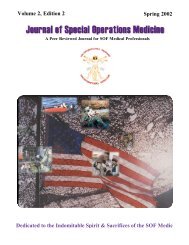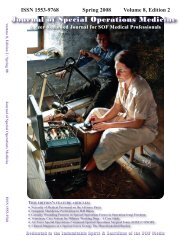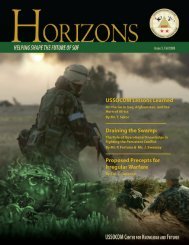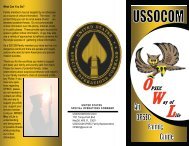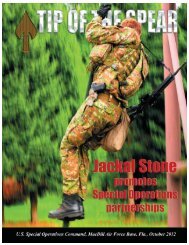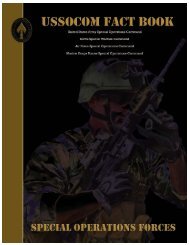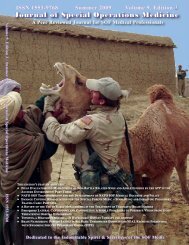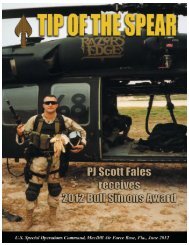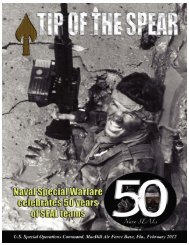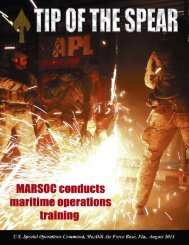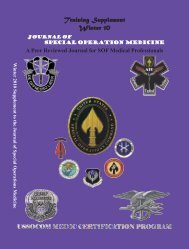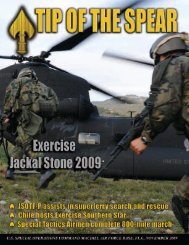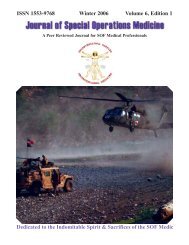October 2011 - United States Special Operations Command
October 2011 - United States Special Operations Command
October 2011 - United States Special Operations Command
Create successful ePaper yourself
Turn your PDF publications into a flip-book with our unique Google optimized e-Paper software.
By Petty Officer 2nd Class Jacob L. Dillon<br />
Naval <strong>Special</strong> Warfare Group 2 Public Affairs<br />
Not far from the equator, in the heart of Africa,<br />
through the haze of humidity and motorcycle<br />
exhaust, down the bumpy red-clay road engulfed by<br />
palm trees school children smile and wave at a<br />
group of Sailors traveling down a road toward the<br />
shore of Lake Victoria to train with Ugandan<br />
<strong>Special</strong> Forces.<br />
A partner force of Naval <strong>Special</strong> Warfare<br />
personnel conducted a Joint Combined Exchange<br />
Training with members of a <strong>Special</strong> Forces Group<br />
from the Ugandan People’s Defense Forces May 23-<br />
July 15 in Entebbe, Uganda.<br />
“Our overall goal was to help Ugandan <strong>Special</strong><br />
Forces enhance their operability and build and<br />
strengthen UPDF’s counter-terrorism capacity,” said<br />
an NSW instructor who participated in the JCET.<br />
“Uganda is a very strategic partner force in this<br />
region.”<br />
The NSW team said its made measurable<br />
progress in their partnership with Ugandan forces,<br />
providing the nation’s fledgling <strong>Special</strong> Forces with<br />
innovative training to improve its capabilities and<br />
build upon their foundation of tactical skills.<br />
But these U.S. special operators had to<br />
overcome challenges, such as cultural differences<br />
and language barriers, while training with their<br />
Ugandan counterparts.<br />
“Communication and patience are essential,”<br />
said an NSW instructor. “Although some Ugandans<br />
speak English and are reliable translators, we must<br />
always ask questions among ourselves [instructors]<br />
and among everybody to clearly illustrate training<br />
points and to better understand each other’s points<br />
of view.”<br />
One of the challenges was teaching Ugandan<br />
<strong>Special</strong> Forces newer and updated approaches to<br />
tactical techniques and concepts, according to Lt.<br />
Peter Olum, a UPDF officer and company<br />
commander.<br />
“We specialize in jungle warfare,” said Olum.<br />
“Much of what we are learning is brand new. Many<br />
of us have never had to use night-vision goggles<br />
before or have never been in close-quarters<br />
combat.”<br />
Naval <strong>Special</strong> Warfare team members also<br />
expanded beyond the operational aspects of the<br />
JCET to focus on other aspects of training with their<br />
partner force.<br />
Petty Officer 1st Class Joe Calderon, a <strong>Special</strong><br />
Two members of Alpha Company, 1st <strong>Command</strong>o<br />
Battalion <strong>Special</strong> Forces Group, of the Ugandan<br />
People Defense Forces, practice a hallway and room<br />
clearing during a Joint Combined Exchange Training<br />
with an East Coast based SEAL Team July 6 in<br />
Entebbe, Uganda. Photo by Petty Officer 2nd Class<br />
Jacob L. Dillon.<br />
<strong>Operations</strong> combat medic, did his part to educate his<br />
Ugandan counterparts on field medical practices.<br />
“Along with being the corpsman for the training<br />
evolutions, I taught my own course as well,” said<br />
Calderon. “I instructed a two-day course on tactical<br />
field response; one-day classroom and one-day<br />
practical.”<br />
Calderon was also the JCET’s resident medic,<br />
and he provided classes on preventative medicine<br />
and other medical care procedures.<br />
“Preventative medicine is especially important,”<br />
said Calderon. “This region is prone to malaria and<br />
other communicable diseases, and members of this<br />
group are from areas of Uganda where other<br />
diseases are known to break out.”<br />
Naval <strong>Special</strong> Warfare team members said their<br />
Ugandan partners were extremely receptive to the<br />
training they received, and both forces look forward<br />
to training together again in the future.<br />
“We appreciate everything,” said Olum. “We<br />
learned so much and are progressively getting<br />
better; practice makes perfect. We would definitely<br />
welcome any other training opportunities we can get<br />
from these guys.”<br />
For the NSW trainers, progress was measured<br />
by clear objectives established at the beginning of<br />
the JCET, and then assessed at the end of the<br />
training.<br />
“The Ugandans’ continued motivation<br />
throughout the JCET really surprised me,” said an<br />
NSW team leader. “They were very responsive to<br />
new training and tactics; they vastly exceeded<br />
expectations. They have set the standard for other<br />
partner nations.”<br />
Tip of the Spear<br />
5



